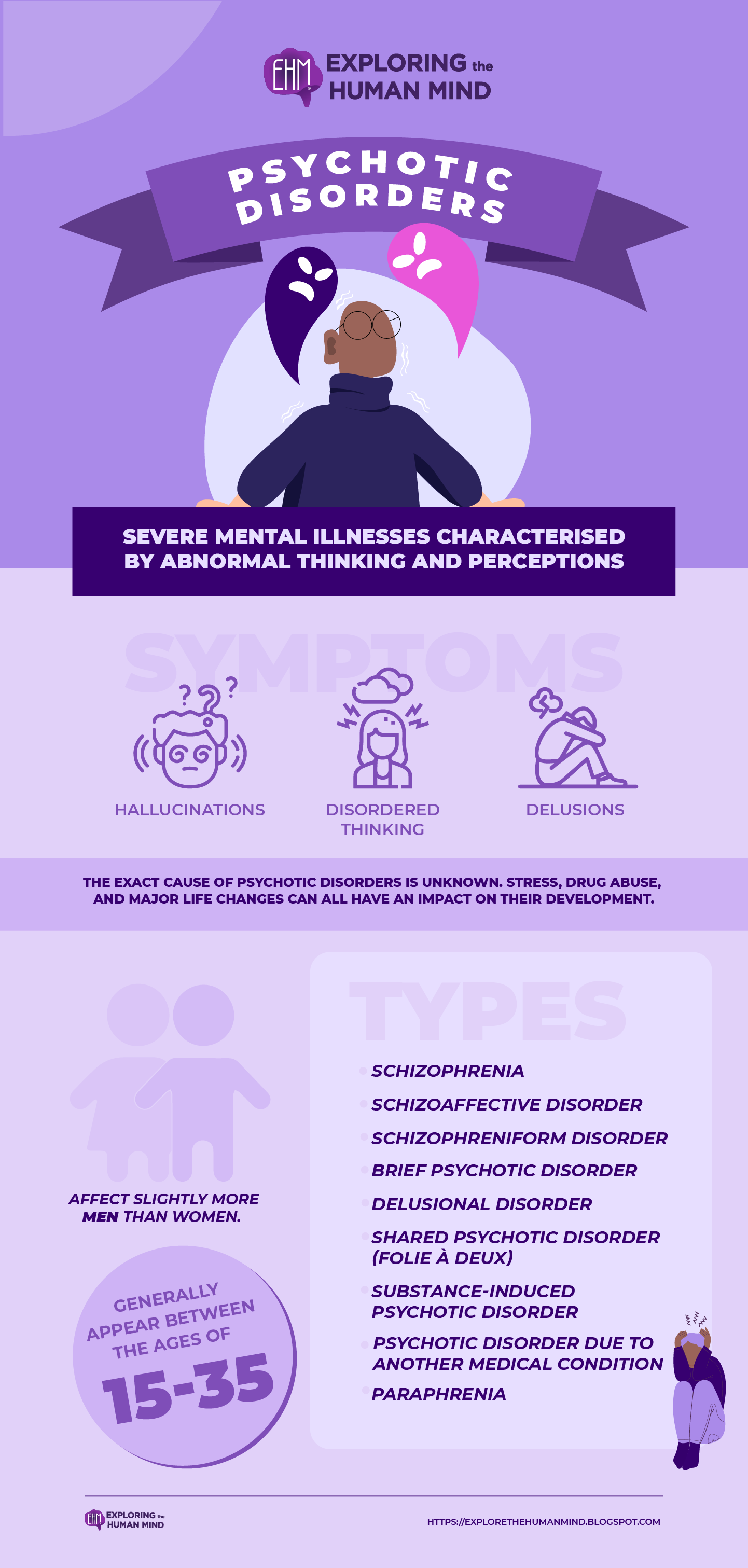Psychotic Disorders
Psychotic disorders alter brain function by causing changes in thoughts, beliefs, or perceptions. People suffering from a psychotic disorder may believe that someone is spying on them or following them, hear voices, or believe that others are manipulating their thoughts. They have difficulty distinguishing between their perceptions and reality.
A psychotic disorder's symptoms can appear gradually or suddenly. A "psychotic episode" is the time when people exhibit these symptoms. It is described as a disconnection from reality. Psychosis has an impact on one's thoughts, emotions, feelings, and behaviour.
People suffering from a psychotic disorder have a difficult time coping with daily life.
Types
There are various types of psychotic disorders, such as:
- Schizophrenia: People with this illness experience behavioural changes and other symptoms, such as delusions and hallucinations, that last for more than 6 months. It usually has an impact on their performance at work or school, as well as their relationships. Understand the early signs of schizophrenia.
- Schizoaffective disorder: People experience symptoms of schizophrenia as well as a mood disorder, such as depression or bipolar disorder. Learn more about schizoaffective disorder symptoms.
- Schizophreniform disorder: This includes schizophrenia symptoms, but the symptoms last for a shorter period of time: between 1 and 6 months. Learn more about the symptoms of schizophreniform disorder.
- Brief psychotic disorder: People with this illness experience a brief period of psychotic behaviour, often in response to a highly stressful event, such as a family member's death. Recovery is usually quick, lasting less than a month. Learn more about the various types of brief psychotic disorder.
- Delusional disorder:The main symptom is having a delusion (a false, fixed belief) about a real-life situation that could be true but isn't, such as being followed, plotted against, or suffering from a disease. The illusion lasts at least one month. Learn more about the different types of delusions.
- Shared psychotic disorder (also called folie à deux): When one person in a relationship has a delusion, the other person in the relationship adopts it as well. Discover more about shared psychotic disorder and how it manifests.
- Substance-induced psychotic disorder:This condition is caused by the use of or withdrawal from drugs that cause hallucinations, delusions, or confused speech, such as hallucinogens and crack cocaine.
- Psychotic disorder due to another medical condition:Other illnesses that affect brain function, such as a head injury or brain tumour, can cause hallucinations, delusions, or other symptoms.
- Paraphrenia:This disorder, which has symptoms similar to schizophrenia or delusional disorder, is not formally recognised in the DSM V. It appears later in life, in the elderly, and may be related to neurologic issues.
Psychotic disorders affect slightly more men than women. These disorders generally appear between the ages of 15 and 35. Most often appear in adolescence, a period during which significant changes occur that affect various areas of young people’s lives:
- Personal and sexual identity
- Separation from parents
- Intellectual maturation
- Start of a career or post-secondary education
- Search for personal and financial independence

vectors by Freepick; graphic design by Vadot
Symptoms
The most common are hallucinations, delusions, and disordered thinking.
Hallucinations are the perception of seeing, hearing, or feeling things that do not exist. For example, a person may see things that aren't there, hear voices, smell odours, have a "funny" taste in their mouth, or feel sensations on their skin despite the fact that nothing is touching their body.
Delusions are false beliefs that persist even after they have been proven to be false. A person who believes their food is tainted, even after being shown that it is not, is suffering from a delusion.
Causes
The exact cause of psychotic disorders is unknown to doctors. Many factors, according to researchers, are at work. Some psychotic disorders run in families, which means that the disorder may be inherited in part. Stress, drug abuse, and major life changes can all have an impact on their development.
People suffering from psychotic disorders, such as schizophrenia, may also experience issues in areas of the brain that control thinking, perception, and motivation.
Reference:
Psychotic disorders. (2022). Gouvernement Du Québec. https://www.quebec.ca/en/health/advice-and-prevention/mental-health/learn-about-mental-disorders/mental-disorders/psychotic-disorders-1#:~:text=Description,others%20are%20manipulating%20their%20thoughts.
What Is a Psychotic Disorder?(2003, February 9). WebMD; WebMD. https://www.webmd.com/schizophrenia/mental-health-psychotic-disorders
Psychotic Disorders. (2015). Medlineplus.gov; National Library of Medicine. https://medlineplus.gov/psychoticdisorders.html






Comments
Post a Comment